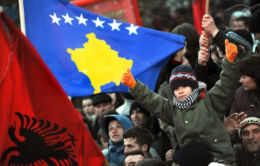2,662 words
The word “woke” was first used as an adjective, as opposed to “awake,” in a political context by black Americans during the twentieth century to describe someone who is “alert to racial prejudice and discrimination.” (more…)
2,662 words
The word “woke” was first used as an adjective, as opposed to “awake,” in a political context by black Americans during the twentieth century to describe someone who is “alert to racial prejudice and discrimination.” (more…)

Kosovars celebrating their declaration of independence in 2008, the most recent example of a new ethnonationalist nation being born among the white race.
3,745 words
The following is a response to Dr. Johnson’s critique (“Against White Unionism”) of my essay “White Nationalism vs. Racially Conscious White Ethnonationalisms” (Part 1 and Part 2).
In the initial part of his response, Greg Johnson makes the following statement: “First, a race is not a nation, it is a biological group. To be a nation, a group needs several traits.” (more…)
1,858 words
Lipton Matthews over at Taki’s Magazine is giving White Nationalists some advice, and I think we’d better sit up and listen. In his essay “Cultural Whiteness,” he tells us we should stop being White Nationalists and instead view whiteness as a “philosophy of progress.” In other words, we should push for a society that is “culturally white,” but racially not so much. (more…)
The follow is the text of the talk that Counter-Currents editor John Morgan delivered to The New York Forum on May 20, 2017.
Tonight I thought I’d talk about Julius Evola, since yesterday (May 19) was his 119th birthday, and I have overseen the publication of many of Evola’s texts in English. (more…)
The follow is the text of the talk that Counter-Currents editor John Morgan delivered to The New York Forum on Saturday.
Tonight I thought I’d talk about Julius Evola, since yesterday (May 19) was his 119th birthday, and I have overseen the publication of many of Evola’s texts in English. (more…)
English original here
Aby zrealizować swoje cele polityczne, Północnoamerykańska Nowa Prawica musi zrozumieć właściwe relacje pomiędzy teorią a zmianą społeczną, metapolitkyą a polityką, teorią a praktyką. Musimy uniknąć dryfowania w kierunku bezczynnego intelektualizmu albo bezmyślnego – a zatem najprawdopodobniej przynoszącego skutki odwrotne od zamierzonych – aktywizmu.
Part 4 of 4
In our final installment we will examine the end of this novel and its denouement. The Heart of Ahriman—the foundation to resist Xaltotun’s magick—has been obtained by Conan after numerous adventures. This means that the Aquilonians do not need to fear his necromancy as they begin their final rebellion against the Nemedians—prior to expelling them from the kingdom for good. (more…)
2,885 words
Author’s Note:
This is the Editor’s Preface to North American New Right, vol. 1, which will be published in June 2012. I wish to thank F. Roger Devlin, Derek Hawthorne, and Matthew Peters for their helpful comments. (more…)
849 words
In our synopsis and analysis, we left Conan and Hadrathus discussing how to regain the initiative by seizing the Heart of Ahriman. Conan then heads south in the funereal barge of a follower of Asura — to make sure that he and Albiona are unmolested — and he quickly makes up the leagues necessary to visit Count Trocero’s Poitain in the deep south of Aquilonia. (more…)
Part 2 of 4
In my previous installment, I had brought Conan up from the pits underneath the Royal palace at Belverus in Nemedia. (more…)
Part 1 of 4
Moving on from my recent review of Robert E. Howard’s “Rogues in the House,” I would like to have a look at the only full-length Conan novel, The Hour of the Dragon (sometimes known as Conan the Conqueror).
This piece again illustrates the subliminal racialism of the Howard mythos as well as providing a template for his mordant, pessimistic, and ultra-conservative views about civilization. (more…)
2,835 words
Part 1 of 4
The life of Jack London, the extraordinarily popular turn-of-the-century American author, was every bit as fascinating as those of the fictional characters depicted in his stories. He was a man of action as well as of thought. (more…)